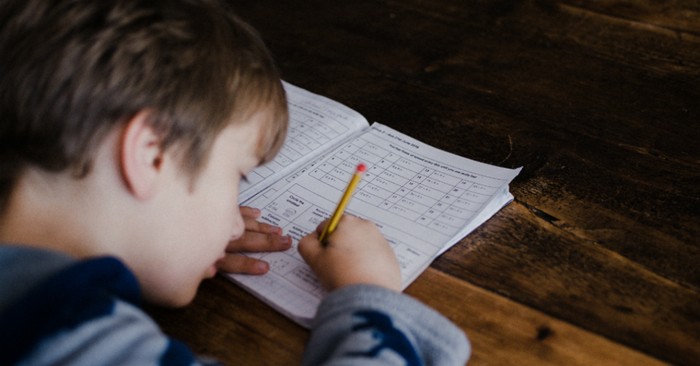
Although test taking has changed through the years, kids can still feel anxious and stressed when they know they have a big test coming up. Tests are a tool that the education system uses to measure how well a child obtains and retains information on a particular subject. These tests are especially important when they take their SATs or PSATs as they indicate if college is the next step in their education.
Regardless of the reason for the test, tests in school are unavoidable. Even if a child knows what's going to be on the exam, they can feel anxious, and if they have trouble retaining the material, they even feel depressed. But following the skills listed below will increase the chances of them performing well on their tests in school and pave the way for more success in their academic future.
Here are six test-taking skills your child should know:
Photo Credit: ©unsplash/Annie Spratt
1. Don't Cram
The worst thing your child can do is cram before the exam. It is tempting to want to memorize and read through tons of material to give a false sense of security that you studied thoroughly. But the reality is the brain is only going to retain a small percentage of what you crammed in. Not only this, but cramming can also make your child extra anxious and insecure that they didn't study all (or even the correct) material. This can cause undue anxiety, which will cause them to become more forgetful once the exam is administered. If your child has trouble studying for long periods, set a timer for one hour. Ask them to cover one chapter at a time and be able to give a thorough summary of each chapter before moving on to the next.
2. Get Enough Sleep
Your child might be up late at night studying to make sure they review and memorize all the material. Not getting adequate sleep, however, can cause them to have a lackluster performance in their other subjects as it’s replacing all their energy on this one test. The best thing you can do is take care of their overall health to make sure they perform their best on this test and in all their subjects. Watch their diet and encourage them to eat a diet high in protein and low in carbohydrates and sugar. Tell them to drink lots of water to stay hydrated so their brain can function optimally. Tell them to get at least eight hours of sleep or more if they can handle it. They want to be fresh and ready whether their test is at the beginning of the morning or late in the afternoon.

3. Skip the Tough Questions
Your child will be tempted to read all the questions to see which ones they know, and which ones will take more reasoning. Encourage them to take each question one at a time. Start with question one and read it thoroughly. If they do not know the answer to the question, ask them to skip to number two and so on (but place a small dot/asterisk by the questions they skip so they're easy to find later). When they have answered all the questions they know right away, ask them to go back and answer the questions they do not know to the best of their ability. When they are done, encourage them to review the material and read through what they wrote. Sometimes your child will not answer a question thoroughly because they're so anxious to get to the next question. As they answer questions, their anxiety will subside, and they will be able to recall the material more easily.
4. Study Smart, Not Hard
Unless the teacher told them explicitly what will be on the test, there will be a level of anxiety as they will not know what's on the test. This may cause them to study and cram in as much material as possible. However, this may not be the best way for them to recall the information when it comes time. Ask them to purchase some index cards, especially for terms that they need to define. Have them place the word on one side and the definition on the other. Make that step all they do to prepare for the exam on the first day. The next day, ask him to go through the pile of index cards one at a time. First, let them look at the definition and see if they can identify the term. Then, flip over the index card and look at the word and see if they can recall the definition. This stimulates different parts of the brain. This will also help children who have difficulty with rote memorization.
They can also use index cards to summarize the information in each textbook chapter or organize the notes they have taken in class. Any material that lists things in steps or with numbers is important to include on the index card. They can put on one side the three steps for example, and then on the other side put the word. As they go through the material, they can use the same strategy as they did with the definition of terms.
Photo Credit: ©Getty Images/monkeybusinessimages
5. Stay Calm
Exams that cover large amounts of material, particularly mid-term or final exams, come with a certain level of anxiety. Even the most studious child will find it difficult to stay calm when they know the pressure is on them to perform on these exams, especially if the exam counts for a certain percentage of their grade. This can cause your child undue anxiety and stress. As a Christian parent, you can take some time and simply pray for your child. Let them know that you will not be disappointed if they tried their best. Help them ease anxiety by taking their requests to God and asking him to help them do their best on their exam.
6. Solidify Their Identity
If they have done their best to study and take the time necessary to prepare, even if they get an average score, it is important for them to know you still love them and that their identity is not wrapped up in their performance. Children, from a young age, try to earn their parents' love and approval through their grades. Taking away this need and letting them know you love them regardless of what grade they get on a report card will allow them not only to achieve peace when they're taking tests but also know they can remain secure in their parents’ love and God's love regardless of how well they perform on a test.
Tests can create anxiety for any person. But by encouraging your child to care for themselves, not solidify their identity on one test, and not find their security in their performance, not only will they be better, well-rounded students, but more successful, well-adjusted adults in life.
Originally published Tuesday, 14 March 2023.










